The system supplied in the Cert-Kits serves primarily for verifying whether the pre-certified source code of the real-time kernel has been transferred correctly from the customer and has generated the real-time kernel with the correct configuration.To this end, the validation software generates a report on the respective evaluation board, which serves as the documentation for this step. The hardware configuration can subsequently be adapted to the safety-critical project or optionally used as a complete replacement for the hardware programming interface (also known as BSP). A repeated execution of the validation software generates a report, which serves as the documentation for the correct function of the real-time operating system.
All the elements required for creating an executable application are provided within the Cert-Kits. These elements include the certified source code, various software manuals such as safety, target integration, user, reference and system manuals. The Cert-Kit also contains validation software (including reference board support package, BSP) and the TÜV certificate pertaining to the type approval of the pre-certified software component. The test environment can be made available to customers on request. The certification documents are also optionally available. If the hardware programming interface from the Cert-Kits is to be used in the safety-critical project, all the artefacts necessary for a certification are also available for this.
“We support our customers in all the phases of the certification, namely from the planning through to the certification on site at the TÜV (Assessment Certification Body),” commented Thomas Amann, Managing Director, Embedded Office. “In addition, Embedded Office certifies the BSP and develops self-test libraries. These libraries make it possible for safety-critical applications to run on the MCUs. They contain detailed diagnostic methods, which ensure the perfect functioning of the controller by performing basic tests of the safety technology. These ‘self-tests’ are used for detecting and clearing faults. These tests include command and register tests of the CPU, PLL clock, startup RAM, online RAM, software watchdog and flash tests.”







